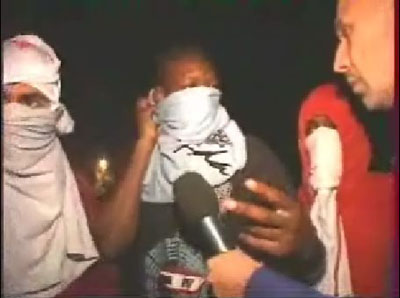MIB
This is the Englsih Translation of a statement by MIB ("Mouvement de l’immigration et des banlieues"), a network of migrants living in the suburbs of french cities. The MIB is involved in anti racist action for years, e.h. they took part in the international border camp in Strasbourg in 2002.
Communique from the “Mouvement de l’immigration et des banlieues”:
“Die in peace my brothers, but die in silence, that we perceive but the distant echo of your suffering” Wednesday, November 9, 2005.  Those who do not understand today the causes of the riots are amnesiacs, blind or both. It has in fact been 30 years that the suburbs have struggled for justice. 25 years that the revolts, the riots, the demonstrations, the marches the public meetings, the cries of anger with precise demands have been formulated.
Those who do not understand today the causes of the riots are amnesiacs, blind or both. It has in fact been 30 years that the suburbs have struggled for justice. 25 years that the revolts, the riots, the demonstrations, the marches the public meetings, the cries of anger with precise demands have been formulated.
15 years since the Minister of Cities was created to respond to the exclusion and the social misery of the so-called disadvantaged neighbourhoods. The ministers come and go with their promises: Marshall Plan, Zones Franches, DSQ, ZEP, ZUP, emploi-jeunes, Cohesion Sociale, etc… The suburbs serve as a escapist release for the ministers, the elect and the media, fevered with little murderous phrases on the “no-go zones”, “the parental irresponsability”, gangsterism, and other “Islamist derivaties”.
The inhabitants of these neighbourhoods, and notably the young, are stigmatized and designated as responsable for all the problems of society. It is all too easy to give a lesson in civics and to point the finger at the ‘scum’ or the ‘savages’, thus throwing them to populist vindictiveness. And this strategy is all too profitable. The suburbs become an isolated problem, which we leave to the police and the courts to solve. Today, we are presented these ‘suburban youth’ (signifying black and arab) who are seen as having come to destroy like foreigners laying siege to France.
Nevertheless, from Minguettes (1981) to Vaulx-en-Velin (1990), from Mantes-la-Jolie (1991) to Sartrouville (1991), from Dammarie-les-Lys (1997) to Toulouse (1998), from Lille (2000) to Clichy, the message is clear:
Enough of these unpunished crimes of the police, enough of the suffering silence of millions of families, of men and women, who suffer daily from the social violence, so much more devastating than a burning car.
With the curfew, the government responds by collective punishment and a law of exception that gives full powers to the police. Just sealing the lid on the cooking-pot will mark the memories of our neighbourhoods for a long time.
There will never be peace in our neighbourhoods as long as there is not justice and real equality.
No pacification nor any curfew will keep us from continuing our fight for this, even when the cameras will have ceased rolling.
NO JUSTICE, NO PEACE!

